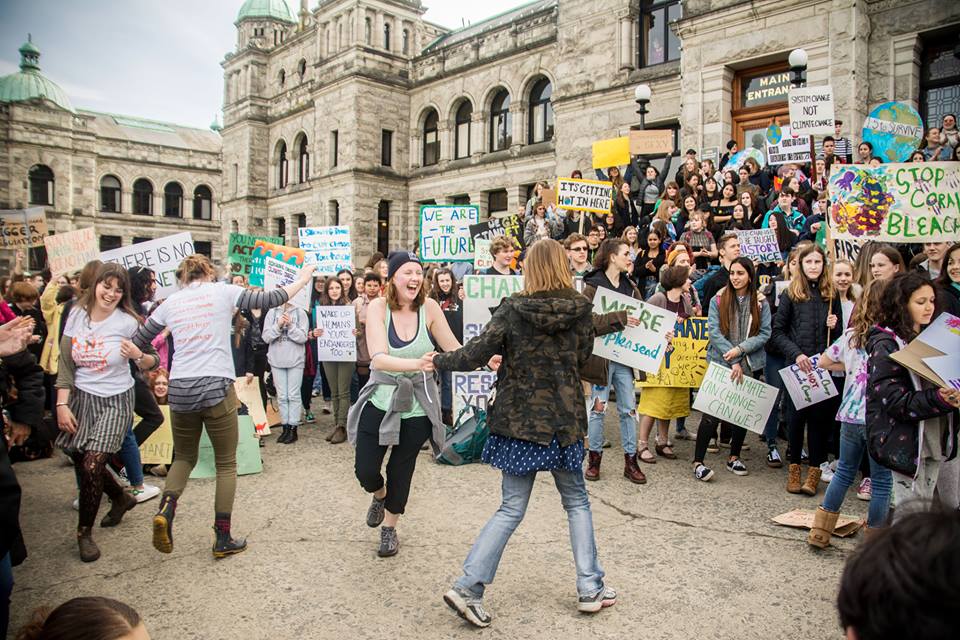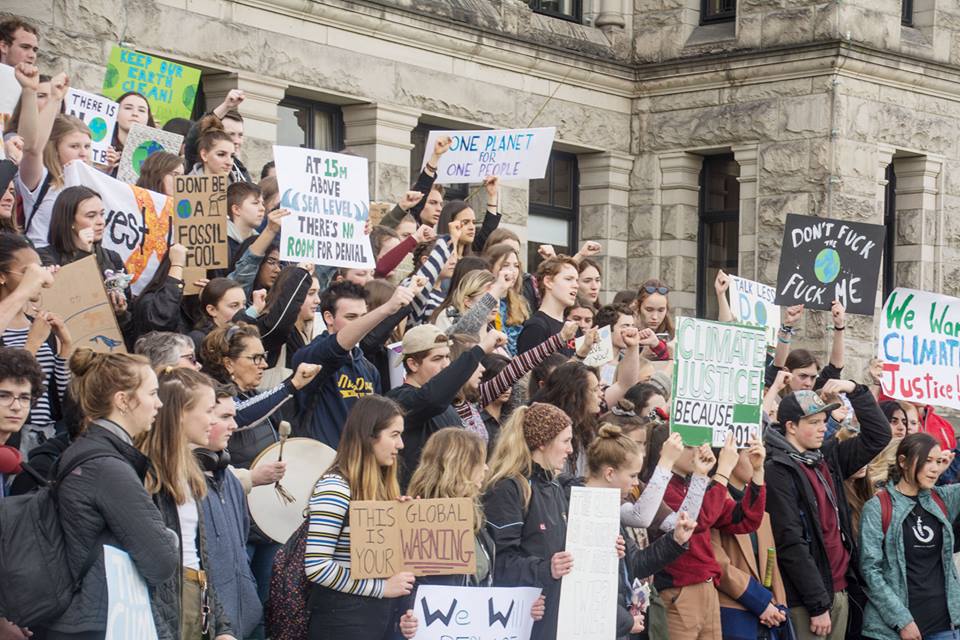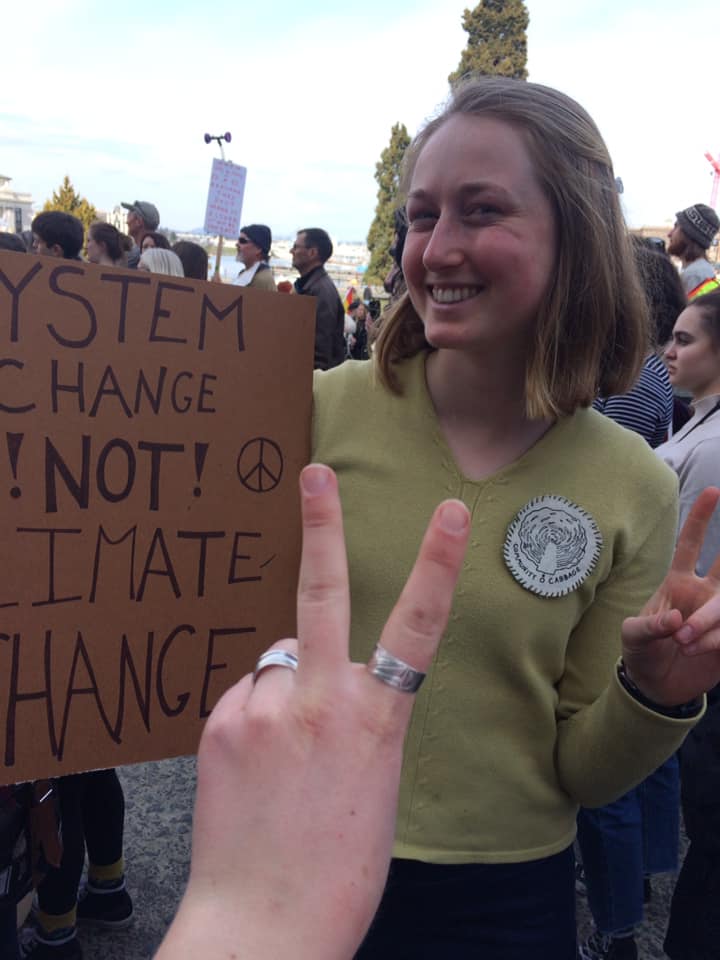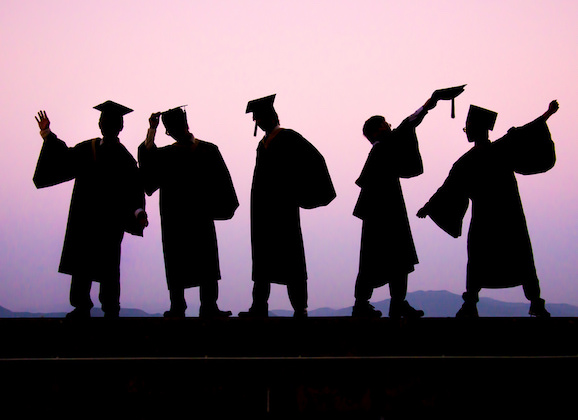I have something to say about climate change.
On Friday, March 15th, I attended the Student Climate Strike at the BC Legislature Building in Victoria, in the company of at least 1000 other passionate young people and adult allies who are concerned about the state of the Earth, and infuriated by the lack of political action to counter the climate change crisis.
This event was part of a growing global movement of student climate strikes that have been occurring in cities around the world since the beginning of the year, demanding immediate and widespread action to address climate change.

A joyous celebration; positive change is brewing. Photo credit to Miranda de Groot
In recent months, I’ve been thinking, writing, and talking a lot about climate change. It’s admittedly the topic that’s been occupying most of my headspace these days, and for good reason, given the immediate urgency and severity of this global crisis.
This semester, I’ve also been fortunate enough to be participating in an incredibly thought-provoking course through the Human Dimensions of Climate Change program at UVic.
Titled ‘Climate Change for Social Transformation’, the course offers essential insight into the social, economic, and political dimensions of global climate change, illuminating how the crisis is both created by, and simultaneously re-creates, aspects of social inequality and corrupt power relations in our society.
Given the inherently interdisciplinary nature of real-world issues like climate change, the course is fittingly taught by three professors from different departments: Sociology, Geography, and Philosophy.
One of my inspiring classmates in this course, Antonia, is at the forefront of the climate justice movement in Victoria, and was one of the main organizers of Friday’s student strike.
In a late-night conversation with Antonia the day before the strike, I was offered the incredible opportunity to be a speaker and share my own current thoughts, perspectives, fears, hopes, and insights around climate change.
When this idea was first introduced to me as a real possibility, I instantly wanted to back down.
All of a sudden, I felt overwhelmed by the complexity of climate change, my mind started racing with all of the overlapping layers of injustice that relate to it, and I doubted whether I had anything clear, meaningful, or unique that I could actually add to the conversation.
I told myself that I didn’t have the answers. I convinced myself that I was still a part of the problem as much as the solution. I was afraid of saying the wrong thing, freezing up, misrepresenting the movement, or getting super flustered and crying my eyes out in front a massive crowd.
Within a minute, I had typed up a message in response, giving some lame excuse for why I wasn’t going to be able to speak at the strike the next day.
Before I had the chance to send it, one of my amazing activist friends, Delacey, who was over at my house for dinner, asked me what I was typing and why I looked so suddenly stressed out.
When I told her, “I’ve been offered a chance to speak at the strike tomorrow, but I can’t do it. It’s too short notice, I’m not sure what I would say, I might have to leave early anyway…” she cut me off before I could finish my run-on sentence, “Hannah, stop it! You have something to say about climate change. You’re going to do this.”
I hesitated for a moment, then looked up and locked eyes with her. She was smiling — confident, supportive, excited. She believed in me, and I knew she was right. I have something to say about climate change.
I stayed up late into the night, staring at the fluorescent-lit screen of my laptop, typing and re-typing sentences, trying to sort out my thoughts. Once I was in the right mindset, the words started to come more easily than I’d expected.
I remembered that climate change matters to me more than anything right now, and I’ve spent plenty of time and energy thinking deeply about it, listening, learning, feeling. I wanted to be heard, and offer whatever I could to support the movement towards authentic positive change.
Once the sun set, rose again, and the strike rolled around, I felt (mostly) ready. At the event itself, I became instantly engulfed by the intense excitement, emotion, and collective energy of the movement. I nearly forgot that I was supposed to be speaking, until I heard my name being announced over the loud speakers.
A bit dazedly, hurriedly, I wiggled my way through the crowd and up to the front, where Antonia passed me the microphone with a firm and reassuring smile.

A beautiful sight, indeed. Photo credit to Miranda de Groot
For a brief moment, I looked out at the crowd, admittedly a little bit shaky. My gaze was met by thousands of passionate and determined young faces, bearing handmade banners emblazoned with poignant messages that ranged from funny to furious. It was the most beautiful sight I’d seen in ages. I inhaled the collective energy, exhaled the self-doubt and said this:
According to the UN Secretary-General, climate change is the greatest existential threat currently facing humanity. To limit global temperature rise to below 1.5°C and avoid the complete collapse of our planetary systems, we need to achieve global reductions in greenhouse gas emissions of 60% within the next 10 years, and net-zero global emissions no later than 2050. At the current global temperature rise of 1°C, devastating impacts are already being experienced around the world. This is a vital source of feedback, indicating loud and clear that our human societies are severely imbalanced and utterly unsustainable.
Ignoring this feedback would be wildly irresponsible, and would yield irreversible implications for the future of life on Earth. Alternatively, embracing this feedback will force us to question the fundamental structures and ideologies that govern our lives. We need to be willing to engage in an intensive process of deconstructing exploitive power relations, correcting social injustices, and restoring our democracy.
Our generation has a uniquely valuable and influential position in this struggle for climate justice. We are the first generation that will inevitably experience the full-blown impacts of climate change throughout our lifetimes, and we’re also the last generation with any real opportunity to mitigate this crisis before it’s entirely too late. This Youth Strike for Climate is underpinned by an intense amount of collective responsibility, moral obligation, and emotional sadness. There is a fundamental awareness that the success or failure of our actions today will yield direct implications for our communities, our families, and our personal livelihoods, now, and for the rest of our lives.
This is perhaps the most simultaneously terrifying and exciting moment that humanity has ever experienced. We need to counter climate change with deep-rooted system change, and there is no time for complacency or inaction. We need everyone, everywhere, doing everything they can, all the time, as quickly as possible. Now, let’s get started.
Thank you to everyone who showed up that day to support this growing movement for climate justice.
Thank you for all of the encouraging cheers, words of gratitude, uplifting smiles, and warm hugs from strangers that I received in response to my speech.
I can’t wait to create a beautiful, sustainable, and equitable future together.
To join the climate justice movement and stay informed about more youth activism coming up soon, check out this page: Youth For Climate.






Oh my gosh Hannah – this is fabulous!!!! What a great post! Now I have to go find some video of your speech!!
Thank you so much, Crystal for all of your support and encouragement! I actually have a video recording of the speech that was just sent to me by someone else who was at the rally. I can send it to you perhaps if you’d like?